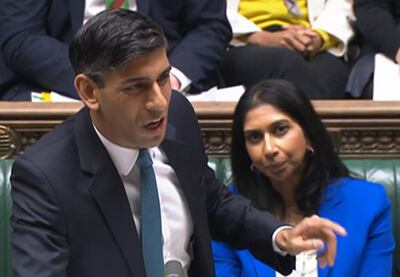Last week, in response to UK Home Secretary Suella Braverman’s proposed plan for asylum seekers in the country, much of the national media, particularly the BBC, focused not on the deep failures in her scheme but on a criticism that was made of it.
If ever the adage of “don’t shoot the messenger” was appropriate, it was compounded by the complete avoidance of what the messenger was talking about. The controversy isn’t the first time that too many in our public arena have prioritised a completely wrong set of concerns – and it probably won’t be the last, either.
Ms Braverman is proposing what is demonstrably a cruel policy on asylum seekers, but one that follows from the discourse that has become deeply prevalent in the British and much of the international media. The underlying premise is that those who wish to claim asylum in the UK have “legal” routes for doing so – which means, if they appear in the UK by other means, it’s a deliberate choice, and they have only themselves to blame for not choosing the more “appropriate” routes. As such, if they do appear, they will be detained and deported within a few weeks.
Of course, this is a fallacy. For the vast majority of people worldwide, there is no effective “legal” route to claim asylum in the UK; the very nature of the contemporary nation-state, with visa requirements and border controls, make that a veritable rarity. According to the Home Office, in the year ending September 2022, the UK resettled nearly 1,200 individuals under UNHCR resettlement schemes. The waiting time varies, with previous statistics suggesting it could take up to six months or more. Moreover, the UK is hardly the most popular destination, even as compared to other Western European countries. In 2022, the UK received 74,751 applications for asylum, as compared to Germany's 296,555, and France's 179,705. The vast majority of refugees settle in countries adjacent to their own, as one might expect.
The different interviews that have been made of Ms Braverman and other officials in the Conservative party make it clear that the scheme is not well thought out at all – indeed, there has been no explanation as to what will happen to asylum seekers if a deportation destination cannot be identified. As for returning them to their countries of origin, which they are seeking asylum from, it would be palpably brutal to do so.

In response to the news, Gary Lineker, a sports commentator who often speaks on the BBC, tweeted that Ms Braverman’s “immeasurably cruel” policy is “directed at the most vulnerable people, in language that’s not dissimilar to that used by Germany in the 1930s”.
What ensued for the following week was bizarre. Rather than focusing on the government scheme, which is likely to affect many thousands of people, mass attention, especially from the BBC itself, was fixated on Lineker’s daring to speak his mind about such a policy. The supposition was that as someone who is regularly commenting on the BBC’s airwaves, Lineker ought not to break the corporation’s rules of impartiality, as a publicly funded broadcaster. Over the weekend, the BBC suspended Lineker from its flagship football TV programme, resulting in a display of solidarity from Lineker’s co-hosts, Ian Wright and Alan Shearer, who announced they will not be turning up to present the show.
The situation is all the more peculiar, given Lineker’s past utterances. The former footballer has previously, for example, spoken about human rights situations in a variety of foreign countries that have good links to the UK – the calls for censure then were rather muted. More starkly, there are other, far more prominent BBC-linked figures such as Andrew Neil, for example, who were identifiably non-partisan for many years. Neil is the chairman of The Spectator, which is certainly of a very particular political perspective, and his Twitter feed often bore out very right-wing viewpoints – but there was no such call for censure, despite his being one of the BBC’s flagship show hosts.
Indeed, one of the broadcaster’s own former employees, Andrew Marr, declared: "BBC news has taken leave of its senses ... This is utterly mad ... BBC can't sack [Lineker] for bias as everyone will turn to the BBC's own chairman [Richard Sharp] who is closely connected to the Tory party." Quite.

But this is a phenomenon that is deeply selective, and ultimately damaging to the nature of public discourse in the UK and elsewhere. Ms Braverman’s policy is what matters here, as are her comments that unjustifiably used populist rhetoric like “invasion” to describe asylum seekers – a rhetoric that could have real consequences on those vulnerable individuals. But instead, much of our commentariat focused on the objection to that discourse and policy – not the discourse and policy themselves.
Ironically, another stark example of the phenomenon happened at the same time, but was directed at the British government rather than in defence of it.
A member of the UK House of Lords, Stuart Polak, criticised Ms Braverman’s colleague, Foreign Secretary James Cleverly, who had announced: “The UK government has not engaged Itamar Ben-Gvir in his role as minister of national security, and we have no current plans to do so.” Mr Cleverly has quite rightly refused to engage with one of Israel’s most far-right politicians, who has already been convicted of eight charges, of incitement to racism and supporting a terrorist organisation.
Instead of focusing on the statements and policies of a political figure many consider to be bigoted – which led Mr Cleverly to issue his clarification in terms of UK foreign policy – Mr Polak chose to attack the foreign secretary for even making such a statement in the first place.
Of course, the House of Lords is not the BBC. But neither does Lineker represent the BBC – he’s not a member of staff, and there is no reason why such restrictions on his freedom of speech should be implemented when so many others have clearly not been subjected to such a standard.
“Shooting the messenger”, as a distraction, it seems, comes in many shapes and forms – and we should call it out as such.


